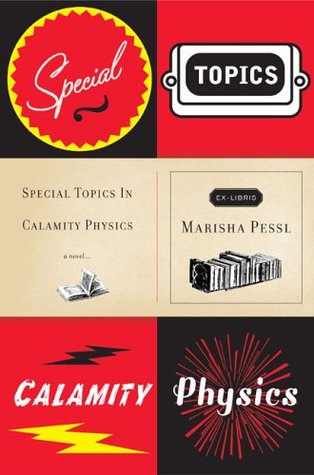Title: Special Topics in Calamity Physics
Author: Marisha Pessl
Publisher: Penguin
Publication Date: August 3, 2006
Source: borrowed from the good ol' public library
Summary from Goodreads:
Marisha Pessl's mesmerizing debut has critics raving and heralds the arrival of a vibrant new voice in American fiction. At the center of this "cracking good read" is clever, deadpan Blue van Meer, who has a head full of literary, philosophical, scientific, and cinematic knowledge. But she could use some friends. Upon entering the elite St. Gallway school, she finds some--a clique of eccentrics known as the Bluebloods. One drowning and one hanging later, Blue finds herself puzzling out a byzantine murder mystery. Nabokov meets Donna Tartt (then invites the rest of the Western Canon to the party) in this novel-with "visual aids" drawn by the author-that has won over readers of all ages.
My Review:
In case you haven't noticed, it's become a bit of a pet project of mine to read through the books listed in this article that I mentioned a few weeks ago: 'We Were Liars' and 8 Other Books You'll Love if you Were Shocked By The Twist in 'Gone Girl'. Because who wasn't shocked by the twist in Gone Girl? I've had more than my share of "blah" reads this year, and I figured this list would be a good pick-me-up. So far, I've not been disappointed.
Special Topics in Calamity Physics is a one-of-a-kind read. The novel opens with our protagonist, Blue Van Meer, informing us of her teacher's suicide. Blue formats her narrative like a college syllabus for an English class, largely due to the influence of her father (a professor). As we go through each literature-inspired chapter, Blue attempts to discover the truth behind her teacher's suicide, but ends up with much more than she bargained for.
There's so much that I love about this novel, but I feel like each stellar point comes with a caveat. For example: I loved Blue's character. She has a great way with words, a nearly photographic memory, and is hilarious (often without meaning to be). She's wise beyond her years, but still struggles with a typical high school need to fit in. However, despite my love of Blue, I continually felt annoyed by the verbosity of her narrative. She uses 10 words (or 10 paragraphs from a classic novel) when one would do. But I TOTALLY GET why she is so wordy. She's brilliant, she's memorized nearly every book she's ever read, and the writing style reflects that. If it didn't, you'd have a completely different character. But even though I completely understand why that was necessary, it was just too much at times, as I felt myself going cross-eyed at her long-winded explanations. Appreciating it doesn't mean that I always enjoyed it, I suppose.
Similarly, we have the central mystery of the story. In the end, I was astounded with how well everything came together. This book is CHOCK FULL of details...really, really minute details (see above paragraph). Given that, it is impressive how cohesively Pessl was able to wrap them up at the end of the book. (There is even a "Final Exam" in the last chapter that leaves you with a few interesting points to ponder.)
However, despite the awesomeness of how the ending was crafted, I was a little bit annoyed with the specifics of the conclusion. The background of the big "reveal" is something that is not alluded to at all earlier in the book, so much so that Blue spends many pages filling us in on historical details late in the novel that are relevant to this game changer. I get a tad irked when a mystery novel takes such a drastic turn that it starts to feel like something got unnecessarily dropped on me out of left field. Twists are a good thing, but completely out-of-the-blue plot details that require enormous explanations towards the end of the book? The story starts to lose its seamless feel when that happens.
Apparently I shouldn't complain about Blue being too wordy, because I'm fairly guilty of that myself in this review. But my final verdict is this: Special Topics in Calamity Physics is immersive. Blue's tendency to ramble may make you leery in the first chapter or two, but push through that introduction, and I promise you'll be in for quite the ride. Despite my misgivings about the direction the novel took in the last 150-ish pages, there are some great twists here, and it will most definitely keep you up til the wee hours wanting to see how it ends.














I think The Sweetness at the Bottom of the Pie was the last mystery I enjoyed. (I've read books with mystery in them, but they weren't labeled as such). I'm not sure I'd be able to handle so much wordiness in this one, though. Hmmmm.
ReplyDeleteI've heard so many people say they love that book, and I have yet to look up what it's about. Ha! Guess I need to do that!
DeleteThat sounds like an interesting list. I feel like I'm the only person left who hasn't read Gone Girl!
ReplyDeleteThis book is intriguing, but I have very little patience for wordiness. I prefer direct, concise writing.
In all fairness, I talk about Gone Girl way too much, so you shouldn't let my comments make you feel left out. LOL.
DeleteI really loved this book. It may have also been a case of the right book at the right time, but my memories of it are perfect. I was really looking forward to Night Film, but ended up disappointed. it was so different from Calamity Physics. And such a great title.
ReplyDeleteIs Night Film her second novel? I'll have to take a peek on Goodreads, I'm curious to see what it's about (even if your experience does sound underwhelming!).
DeleteI really liked this one, more than Night Film. But it might have been a genre thing for me. I love a good literary mystery but scary books are not really my thing!
ReplyDeleteDidn't know Night Film was a scary one. I just read the description and it's amazing how different it sounds from Calamity Physics! I'd be interested in reading it at least to see how well Pessl is able to jump between genres.
DeleteThere are many definitions of education but in a simple way, education is an act or process of passing on or gaining general knowledge, building the ability to reason and judge, and generally training oneself or others mentally for matured life. Many underdeveloped countries today do not pay attention to the importance of education in the society and this has made most countries not to be developed. online classes
ReplyDelete